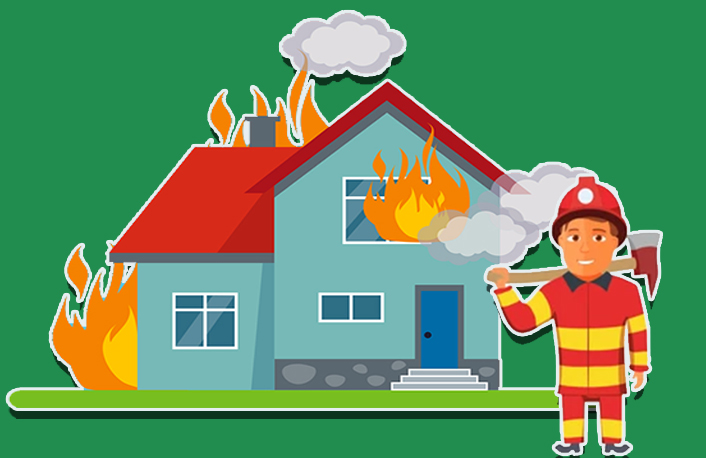Your home is known as your significant asset that needs to be covered at all times. As a homeowner, you should be aware of any possible wildfire during the hot or dry season especially if you reside in a city, suburb, or rural area. This weather condition turns everything into a fire hazard making it hard for firefighters to extinguish the fire in that region.

With wildfire insurance, you can have a backup plan that allows you to remodel your home and cover you after a dangerous fire. However, you can depend on your home insurance policy as it might not be enough to cover the damage. In other words, ensure your policy will offer adequate coverage to prevent financial damage.
What is Wildfire Insurance
Wildfire insurance is a coverage type that is added to a standard home insurance policy from a provider accepted by the state. However, insurance providers that offer policies in areas at high risk of wildfires are increasing premiums, restricting coverage, or refusing to renew policies to reduce their financial losses.
To get a lower risk of a wildfire, check the perils that are covered and excluded in your policy or quote to ensure wildfire is included. Moreover, home insurance often covers smoke and fire damage but it varies occasionally:
- Your house structure.
- Personal possessions.
- Landscaping.
- Building code improvement.
- Living expenses.
- Detached buildings, like a shed or garage.
In addition, detached buildings and landscaping may not get coverage from all policies.
Does Home Insurance Cover Wildfire
The majority of home insurance offers fire damage like wildfire as a covered peril. However, it might be the same situation for those who reside in areas with a high risk of wildfires. In such cases, your provider might restrict or not cover wildfire insurance from your policy. Moreover, it’s crucial to understand the different ways your coverage can support you recover if your home policy offers financial coverage from wildfires.
Dwelling coverage
Wildfire insurance covers the cost of repairing or replacing a home’s physical structure and attached structures. Over the last five years, rebuilding costs in California have risen by more than 33 percent. To ensure adequate coverage, consider purchasing an inflation guard, extended replacement cost endorsements, or negotiating with an agent to increase your dwelling limit.
Other structures coverage
Other structures coverage offers financial help to rebuild or replace any detached garages, shreds, fences, and pool houses that were destroyed by wildfires on your property. This coverage is somewhat the same as dwelling coverage. For any detached structures, ensure you give adequate coverage for remodeling any detached structures like gazebos or garages that are on your property during a wildfire. Generally, 10% of your total dwelling limit is covered by other structures.
Personal property coverage
If your personal belongings get destroyed in a wildfire, personal property insurance can cover the expense of replacing or fixing them. Properties like electronics, clothes, appliances, and furniture can be covered by this coverage. Before you choose personal property coverage limits, ensure you have enough coverage limits.
Even if your home isn’t destroyed by wildfire, smoke damage may require the replacement of numerous belongings. The personal property coverage amount under a HO-3 home insurance policy is equal to half of the total dwelling limit. Setting plans for your personal property in an endorsement if you have valuables that need higher coverage limits.
Loss-of-use coverage
This coverage, also known as additional living expenses, pays for meals, lodging, and other costs covered when you are unable to return home following a disaster like a wildfire. Having loss of use coverage is important especially if you reside in California. You will have to find another place to live while your house is being rebuilt if a wildfire destroys it. The typical range for loss of use policy limits is 20–30% of the dwelling limit.
When Does Home Insurance Not Cover Wildfire
Since home insurance can cover wildfires, there are situations where certain costs might not be. For instance, damage brought on indirectly by a fire might be excluded by your insurance. Hilly regions are at risk of landslides due to the deficiency of vegetation, a common outcome of wildfires. Earth movements are known as landslides, and they are not covered by a typical home insurance policy.
Does Condo Insurance Cover Wildfire
The “inside walls” of a condo are protected from fire damage by a condo insurance policy, including damage from wildfires. The outside walls and roof of a condo are covered by the homeowners association’s (HOA) master policy.
Similar to homeowners insurance, condo insurance will pay for additional living expenses if damage covered by your policy prevents you from residing in your condo and will also cover your possessions (clothes, furniture, etc.).
Does Renter Insurance Cover Wildfire
A renter insurance policy will pay for wildfire-related damage. This will cover everything you own, including additional living expenses and loss of use. If the apartment is destroyed, your personal belongings and additional costs, such as lodging and meals, will not be covered by the landlord’s insurance policy.
Where Can I Get Wildfire Insurance
If wildlife insurance is not included in your home insurance, you should know if you can include it in your coverage. You might be able to obtain coverage through the FAIR plan. It is a state-mandated program that gives access to insurance for high-risk properties if you’re unable to obtain coverage because you reside in a high-risk area.
Fair Access to Insurance Requirements is referred to as FAIR. Insurance providers are not renewing policies where they are allowed to in many areas where wildfires have destroyed homes. However, some state insurance commissioners impose a one-year moratorium on non-renewals after a wildfire. You can appeal an insurer’s decision not to renew you.

